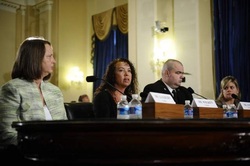
The Defense and Veterans Affairs departments are failing to provide adequate mental health services to troops and veterans with post-traumatic stress disorder caused by sexual assault — a deficiency that contributes to lifelong struggles, military rape survivors told Congress on Friday.
Earlier this week, the DoD Inspector General reported that more than 10 percent of sexual assault allegations within the military are not adequately investigated.
Speaking before the House Veterans’ Affairs Committee’s health panel, four former troops said the military and VA also fail to provide adequate, timely access to health services and counseling for sex assault victims.
“Why is PTSD related to sexual assault so long lasting? It’s because it’s not properly treated or dealt with,” said Lisa Wilken, a former airman who was raped at age 22 by a co-worker.
The Pentagon estimates that 26,000 incidents of sexual assault, ranging from unwanted sexual contact to rape, occur each year across the services. But only about 3,600 are reported, according to anonymous surveys conducted by DoD.
Many don’t file reports out of fear of reprisal, concern for military careers or because they didn’t want anyone to know, according to the surveys.
But victims also don’t seek help because they have no faith the system, according to lawmakers.
None of the speakers was ever asked about their military history or sexual assault by initial screening physicians at VA and DoD; just one had received one-on-one mental health counseling for PTSD; and all wanted to avoid getting care at VA because of the prior treatment they’d received.
“When I had appointments at VA where [the sexual assault] was not addressed or acknowledged, I felt victimized and belittled again,” said former Marine Corps Maj. Tara Johnson, who said she was assaulted by a senior officer while attending Officer Candidate School in 1994.
For men, proper treatment at VA for sexual assault-related PTSD is even more elusive, said Brian Lewis, a former sailor and victims advocate who was beaten and raped in 2000 by a male senior on the submarine tender Frank Cable.
According to Lewis, only one of VA’s 12 residential treatment programs for sexual assault-related PTSD accepts male patients.
He attended that program, at Veterans Affairs Medical Center Bay Pines, Fla., to find that group therapy often was coeducational, a situation he found uncomfortable.
And when he attended outpatient therapy at his local VA hospital, he found there were no outpatient groups for male rape victims and he was not allowed to attend the women’s group. Instead, he went to a PTSD group where he was reluctant to discuss his issues around combat veterans.
“This marginalizes male survivors by forcing them to maintain their silence about their experience,” Lewis said.
Last year, VA treated 85,474 patients for care related to sexual trauma, an increase of 11 percent over 2011.
Each VA medical center has a military sexual trauma coordinator responsible for patient oversight, said Dr. Rajiv Jain, VA assistant deputy under secretary for health for patient care services.
“VA is committed to ensuring eligible veterans have access to the counseling and care they need to recover” from military sexual trauma, Jain said.
Last year, the VA Inspector General reviewed the health records of 166 female veterans with a history of military sexual assault to determine their access and quality of care received. The IG found that more than three-quarters of patients were involved in two or more types of outpatient treatment, 72 percent received individual therapy, 67 percent were on medication and 37 percent participated in group therapy.
It also found that most of VA’s inpatient programs for sexual assault-related PTSD were underutilized.
The IG recommended VA establish a comprehensive resource list on military sexual trauma for providers and ensure that coordinators have time to fulfill their outreach roles.
According to the IG, most VA programs for military sexual assault “are a valuable resource available to serve clinically complex veterans with a history of military sexual trauma, and associated mental health and psychosocial burden,” Dr. Michael Shepherd of the VA IG office testified at the hearing.
But lawmakers said that response falls short of veterans’ expectations.
“Hearing the first panel was disconcerting, devastating. Your response to the testimony doesn’t seem that the sense of urgency is there,” said Rep. Julia Brownley, D-Calif.
“I feel like we’re in two separate worlds,” said Rep. Jackie Walorski, R-Ind. “We just heard gut-wrenching testimony from courageous people whose lives have been ruined, and I’m frustrated because I’ve been asking questions since I’ve been here. The customer service may be going great for those who access the programs, but for tens of thousand of people, it isn’t working.”
House and Senate lawmakers of both parties continue to press the Pentagon to revamp the military justice system to remove decisions on prosecution, trial and punishment for sexual assault from the chain of command.
The House in June passed a bill sponsored by Walorski that would require the inspector general to investigate allegations of retaliation in connection with service members reporting sexual assault and to treat reports on sexual assault as communications protected by military whistleblower laws.
Veterans at the hearing said they have little hope VA will be able to provide adequate care and pressed for the department to bolster programs that would allow them to see private practitioners at VA expense.
“We need the ability to go out of VA if the services we need are not available,” Wilken said. “There are a lot of men and women who will not come to VA because of the experience they had in the military.”
By, Patricia Kime

 RSS Feed
RSS Feed
